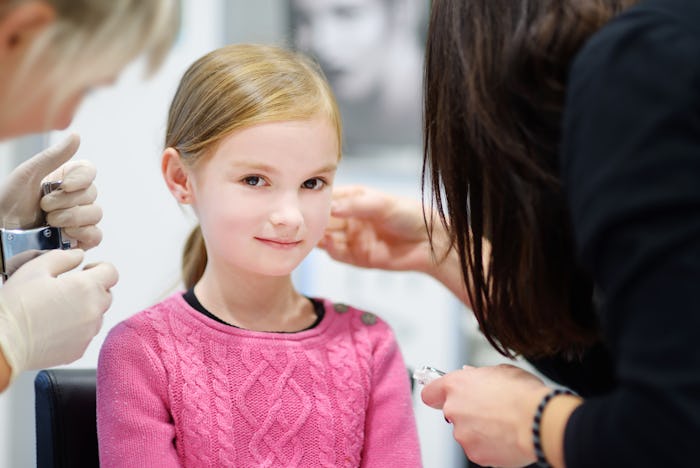Life

How Getting Their Ears Pierced Affects Kids Later In Life
As a parent, it's normal (and good) to weigh your decisions very carefully when it comes to how they might affect your kids and their bodies. One "hot button" topic that every parent seems to have different opinions on is how getting their ears pierced affects kids later in life.
Some argue that it's easier to do it when they're younger and it just looks pretty cute. There are cultural associations with getting baby's ears pierced as well that may encourage a parent to do so sooner rather than later. Others consider it a "rite of passage" for girls to share with their moms when they're older and a little more responsible. Still, some have issue with piercing at such a young age. Whatever your thoughts may be on the matter, knowing how ear piercings affect your kid is the most important thing to consider.
Although there is a shortage of information available about any physiological ramifications that piercing your child's ears when they're young (and it's likely that it would affect each child differently if at all,) there are a few warnings about physical dangers that may convince some parents to wait until their kiddo's ears are more fully developed. Knowing the potential negative effects can help parents make an informed decision about whether they think it's best to pull the trigger (figuratively, of course, piercing guns are rarely used nowadays,) or wait until their little one is a bit older.
The first, and most obvious risk, is the potential of infection. Although most ear piercings heal normally, ear piercings are a bit more risky for small children, who are already more at risk for infections to develop. According to John Hopkins Medicine, since young children or toddlers are unable to care for the piercing site themselves, and are more prone to touch and grab at it, infections are common. Even with proper cleaning and treatment, an infection could leave lasting damage to a child's ear lobe and make it difficult and more painful to re-pierce in the future.
Similarly, the aforementioned John Hopkins Medicine article also noted that younger children are more likely to develop allergies to the metal (typically gold) used to pierce their ears.
Additionally, the American Academy of Pediatrics noted that although the risks are small, it's best to wait until your child is old enough to take care of their piercing themselves, to diminish the risk of infection or other damage. Baby Center noted that other practitioners suggest waiting until your baby is at least 6 months old and their ear lobes are fully formed to diminish the risk of crooked holes or mismatched piercings as they get older.
Although the decision is ultimately up to each parent, making sure to weigh the immediate and long term effects it may have on your baby, toddler, or child is the most important part of the decision.